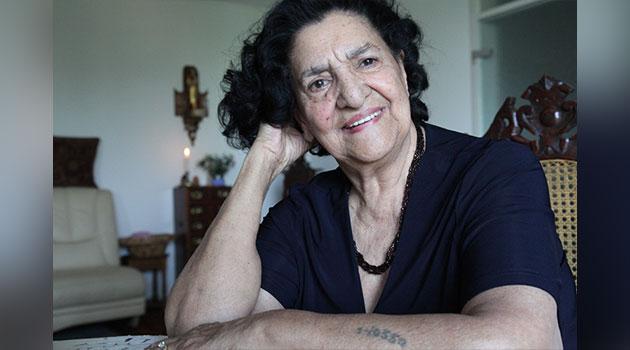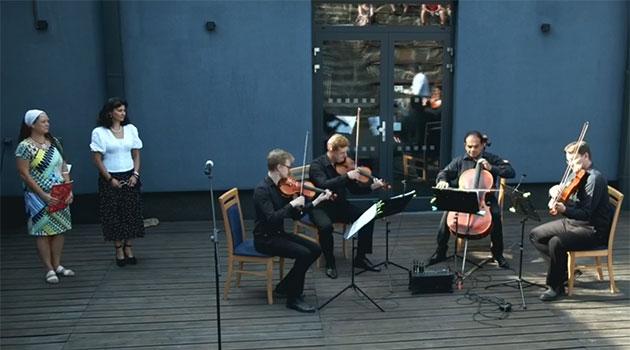First Czech translation of Holocaust survivor Philomena Franz's memoirs being released

Neglected, overlooked, unrecognized… These are all terms used to characterize the Holocaust’s Romani and Sinti victims, whose suffering during the Second World War is now commemorated during the month of August.
About 15 000 books on every possible subject are published annually in the Czech Republic, but just a handful are especially about the Holocaust and its Romani or Sinti victims. These now include the first Czech translation of the autobiography of a Sinti survivor, Philomena Franz, entitled “To Live without Bitterness: Story of a German Sinti Woman Who Survived the Holocaust” (Žít bez hořkosti. Příběh německé Sintky, která přežila holokaust), which has now been published by the KHER press, specializing in Romani authors, 36 years after it was originally released in German.
Philomena Franz (born 1922) also authored children’s literature, collections of poetry, and two volumes of brief reflections and sketches. For her tireless commemoration of the Holocaust, her work with youth, and her work for reconciliation, she received several awards during her lifetime, including the Federal Republic of Germany’s Order of Merit in 1995, the Woman of Europe award in 2001, the North Rhine-Westphalia Order of Merit in 2013, and honorary citizenship of the town of Bergisch Gladbach, where she lived a significant part of her life (2021).
This edition of the Czech translation from the German original includes an interview with the 99-year-old survivor recorded this spring and an epilogue summarizing the attempts to achieve recognition of the genocide of the Roma and Sinti, and was launched to the public on 18 August during the traditional commemorative ceremony at the Hodonín u Kunštátu Memorial, located at the site of the former Zigeunerlager from which, 78 years ago, Czech and Moravian Roma and Sinti were transported to the Auschwitz II-Birkenau extermination camp, where they were murdered in the gas chambers. Czech society still does not know very much about the fate that befell the Roma and Sinti during the Second World War – just like Jewish people and other minorities whom the Nazis pursued, they faced persecution and systematic slaughter.
During the immediate postwar period, publications about antisemitism and the genocide of the Jewish people (the Shoah) have been published worldwide, but it was not until several decades after the war that the first authentic testimonies by Europe’s Roma and Sinti were published. One such book was the autobiographical narrative published in 1985 by Franz, which records the fate of the members of the Haag family of artists who, prior to the Nazis’ rise to power, had been recognized musicians and performers enjoying renown all over Germany and even in Paris.
In the spring of 1943, their lives were fatally transformed, and Philomena, who was 20 years old at the time, was forcibly relocated along with her relatives, as members of an “undesirable” group, to the concentration camps, where most of them died. In her book a strong contrast to these wartime events is her description of an idyllic childhood and the Sinti traditions in those days.
According to Franz, it was exactly the Christian values and approach to life and to nature transmitted to her by her parents and one of her grandfathers that helped stop the hell of the concentration camps at Auschwitz II-Birkenau, Sachsenhausen and Wittenberg, where she was imprisoned. The first reader of her memoir, who was also Franz’s mentor, was Nobel Prize for Literature winner Heinrich Böll, who highlighted her talent for observation, her sense of detail, and her ability to build tension in her narrative.
“The stories of Romani men and women who suffered during the war, or whose families were decimated outright by the war, are mostly unknown to the public to this day. Romani people themselves have not had much appetite during the postwar period to publicly share what happened, perhaps even because they could tell society is not curious about them, that it isn’t ‘attuned’ to this history. It is impossible to share a very painful subject, one that is almost intimate, in an inappropriate milieu – to do so is even more painful. The story of a Romani woman from elsewhere may be more acceptable. This is a story that is similar, in many respects, to the fate that befell the Czech and Moravian Roma who were forced to live through this,” believes Jana Horváthová, an historian and the director of the Museum of Romani Culture in Brno which is administering both of the memorials to the Holocaust and its Romani and Sinti victims in the Czech Republic and convenes commemorative ceremonies to honor their memories.
“I don’t rattle a saber”
The Czech edition, translated by Eva Zdařilová, includes several specific additions that are not in the German original, above all a unique interview with the author recorded in the spring of 2021, which provides the fuller context of the author’s life. Renata Berkyová, an historian of Romani origin, has written an epilogue focused on the history of the recognition of the Holocaust of the Roma and Sinti in the Czech Republic and in Germany, contributing several absolutely new findings about the written testimonies of Romani and Sinti survivors on Czech and Moravian territory.
This edition includes reproductions of archival documents about the author’s imprisonment and family photgraphs that she has never allowed anybody to publish before for reasons of tradition regarding respect for the dead. The cover and illustrations were created by Ladislava Gažiová, a visual artist with Romani roots.
“It is doubly important that Philomena Franz be discussed – on the one hand, hers is a story of the still-ignored Holocaust of the Roma and Sinti, on the other hand it is a story of enormous heroism and humanity. Philomena escaped from a concentration camp – it is difficult to imagine what that must have meant for her as a 20-year-old girl. However, we find countless heroes among the Romani people. How many Romani people in Slovakia fought and worked with the partisans, how many of them helped other Romani people who escaped to hide… Romani people frequently know these stories, they are a component of their collective or their family histories. If those narratives were to become part of Czech society’s general awareness, that would be a big step forward,” says Radka Patočková, director of the KHER press, about the importance of publishing the memoirs of this Holocaust survivor of Sinti origin in Czech translation.
Through her literary output and her lecturing activity, Franz has done her best to contribute to reconciliation and to dialogue. At several points in her life story, for example, she commemorates those whose attitudes helped her survive the Holocaust.
“Not every German was a Nazi. Thank God for that. It saved some people’s lives. Even in the camps there were people who risked their own lives for us. For example, my foreman in the factory producing munitions in Wittenberg, where I did forced labor, he was a sign of hope for me. His wife would pack a snack for me, bread and margarine, and he would bring it to me,” Franz recalls in the interview included in the Czech edition.
“The history of our area, which is to say the Central European lands, is full of scars after the experiences of the 20th century, wounds that are open and weeping to this day. One of these is the genocide of the Roma and Sinti during the domination of Europe by the Nazis. I am convinced that this book by Mrs Philomena Franz will contribute to acknowledging these still-open wounds and I believe it will help with their healing. I believe it will help many people comprehend that the Nazis did not murder those who were unknown to us, or different from us, or foreign to us, but it was our fellow citizens whom they murdered,” notes Jiří Padevět, director of the Academia press and an author who especially maps the history of the Protectorate of Bohemia and Moravia as well as the postwar era.
The publication of this book has been supported by the Česko-německý fond budoucnosti / Deutsch-Tschechischer Zukunftsfonds [Czech-German Fund for the Future], the Goethe-Institut Prag, Bader Philanthropies (USA), Kabinet MÚZ and Tomáš Kohl. It was translated by Eva Zdařilová, edited by Karolína Ryvolová, and the epilogue was authored by Renata Berkyová.
The first edition by the KHER press was released on 16 August 2021 and has 116 pages. It is available through Kosmas booksellers in the Czech Republic and online through the KHER press.
